CHICAGO RIDESHARE ACCIDENT LAWYER
PRACTICE AREAS
The Chicago rideshare accident lawyer group at Curcio & Casciato helps accident victims secure financial compensation from major companies, like Uber and Lyft, who offer rideshare services. With decades of experience handing insurance claims, our Uber and Lyft accident lawyer team fully understands the challenges of dealing with independent contractors and rideshare insurance companies.
If you’ve been injured in an accident, whether an Uber or Lyft accident, the dedicated Chicago rideshare accident lawyers from our law firm are adept at negotiating with the rideshare insurance adjuster and offer personalized legal representation for clients.
If you’re trying to file an accident claim and are getting nowhere with the rideshare company after a serious accident occurred, call (312) 321-1111 to schedule a free consultation with an experienced rideshare accident lawyer in Chicago. Our law firm operates on a contingency fee basis, so accident victims don’t owe any legal fees unless our personal injury lawyers are successful with your rideshare accident claim.
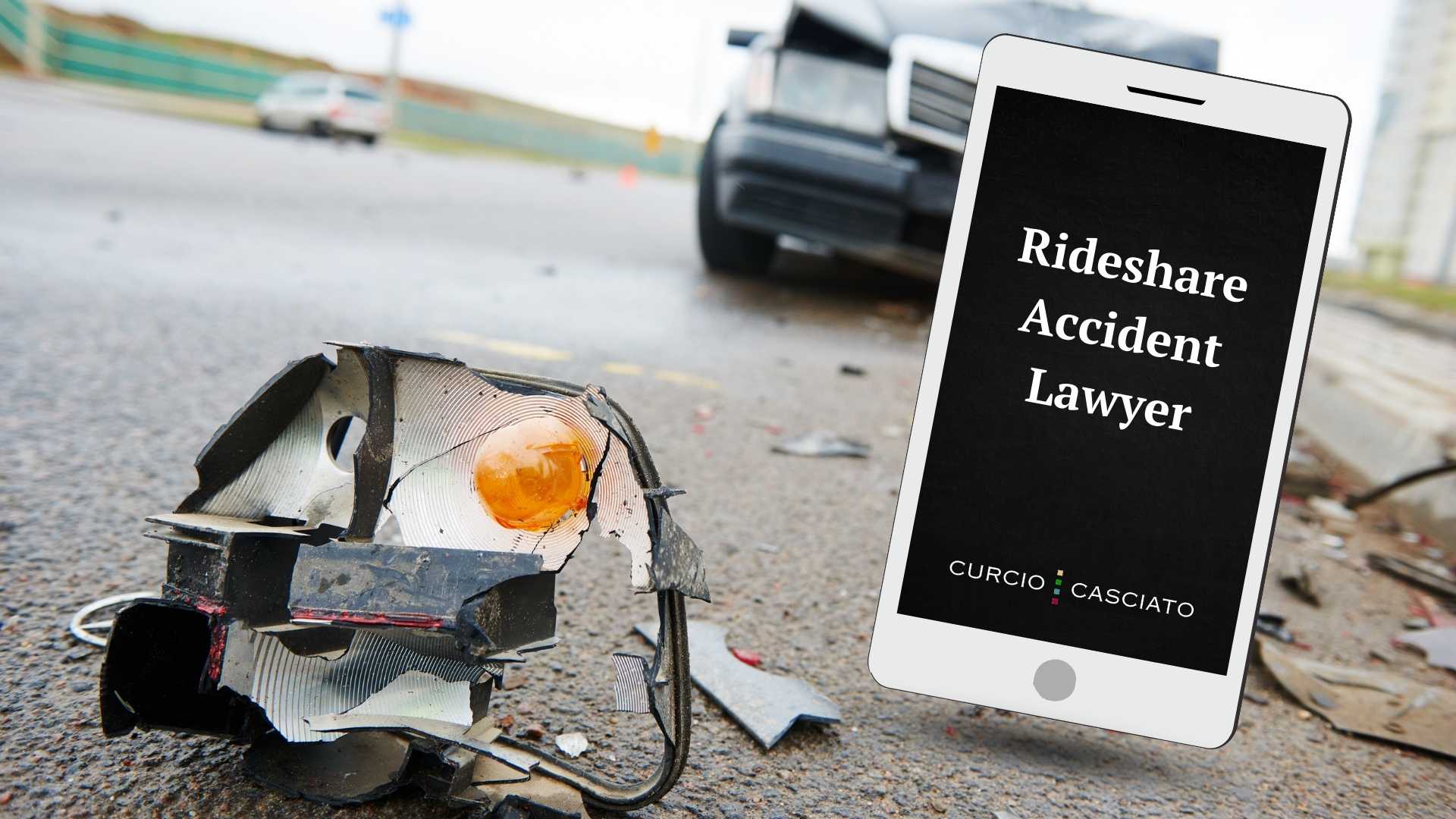
Chicago Uber Accident Lawyer
If you have been injured in an accident involving an Uber Driver, whether you were a passenger or the other driver, a Chicago Uber accident lawyer from our law firm can provide critical support in pursuing compensation.
Uber accidents often result in significant medical bills, property damage, and emotional trauma, leaving accident victims unsure of how to navigate the legal process against companies like Uber or Lyft who offer rideshare services.
A Chicago Uber accident attorney can investigate the motor vehicle accident, gather evidence, and negotiate with rideshare companies or their insurers to ensure you are fairly compensated. Whether the crash involves another rideshare vehicle or a third-party driver, an experienced Chicago Uber accident lawyer from our law firm can handle the complexities of the personal case, allowing you to focus on recovery while we fight for the justice you deserve.
Call (312) 321-1111 to schedule a free consultation with a skilled Uber accident lawyer in Chicago.
Chicago Lyft Accident Attorney
If you have been injured in an accident involving a rideshare vehicle, a Chicago Lyft accident lawyer can guide you through the complexities of filing a Lyft accident claim. Determining liability and identifying applicable insurance coverage can be challenging, especially when multiple insurance companies are involved, including those of the driver, the rideshare company, and other parties. A skilled Lyft accident lawyer in Chicago can negotiate with each insurance company on your behalf and ensure that your rights are protected. If necessary, we can also file a personal injury lawsuit to seek financial compensation for medical costs, lost income, and pain and suffering, giving you the best chance of recovering what you are owed.

Common Causes of Rideshare Accidents in Chicago
As trusted Chicago personal injury attorneys, we have identified key causes that often lead to motor vehicle accidents involving rideshare companies like Uber and Lyft.
Distracted Driving
Rideshare drivers often use smartphones to navigate routes, communicate with passengers, and accept ride requests, which can divert their attention from the road. Illinois texting and driving laws prohibit drivers from using handheld devices while driving. This applies to taxi drivers and rideshare drivers.
If you were injured in an accident because a Lyft or Uber driver was distracted, our Chicago distracted driving accident attorney team can help you file a personal injury lawsuit that covers medical costs, vehicle damage, and other damages associated with the Uber or Lyft accident.
Rideshare Driver Navigating Unfamiliar Roads
Rideshare drivers may find themselves in areas they are not familiar with, relying heavily on GPS navigation. This can lead to sudden stops, missed turns, or unsafe driving maneuvers, increasing the risk of motor vehicle accidents. Our car accident lawyers in Chicago understand how unfamiliarity with local roads can contribute to accidents.
If you were injured in an accident that a rideshare company driver caused, contact an experienced Chicago rideshare accident attorney from our law firm for a free case evaluation.
Unsafe Parking and Pickup Locations
Our rideshare accident lawyers in Chicago often handle cases stemming from unsafe parking or pickup locations, which can create serious hazards. When a rideshare driver stops in an unsafe area, it increases the risk of car accident scenarios or even dooring accidents in Chicago, where passengers or cyclists are struck by an open door.
These poorly chosen locations not only endanger passengers but also put other road users at risk.
If you were injured in an accident because of a rideshare services provider’s drop off or pick up location, our Chicago rideshare accident attorney team can assist with your personal injury case against the rideshare company, seeking compensation for medical attention costs. Additionally, if you were assaulted or attacked, our negligent security lawyers in Chicago can help to ensure your personal injury lawsuit is taken seriously by the rideshare company.
Brake-Checking Car Accident
A Chicago rideshare accident lawyer can assist victims of car accident claims involving brake-checking, a dangerous and aggressive driving behavior. Brake checking is illegal in Chicago and occurs when a driver intentionally slams on their brakes to cause a collision, often involving vehicles like Uber and Lyft rideshare cars. Victims of an Uber or Lyft accident in Chicago may be entitled to compensation for medical bills, lost pay, and other losses caused by the brake-check car accident. Consulting a Chicago brake checking car accidents lawyer ensures that accident victims have the legal support needed to pursue justice and hold negligent drivers offering rideshare services accountable.
Drunk Driver in the Other Vehicle
An experienced rideshare accident lawyer in Chicago can help victims navigate the complex claims process after a drunk driving Lyft or Uber accident.
Drunk driving rideshare accidents can involve multiple liable parties, including the rideshare driver or even establishments that overserved alcohol under Illinois Dram Shop liability laws. Victims who are injured in an accident caused by a drunk driver may face medical attention expenses, lost paychecks, and emotional distress, all of which warrant financial compensation. To hold the responsible parties accountable and recover damages, consulting a Chicago DUI accident lawyer or Dram Shop attorney in Chicago from our law firm is essential for ensuring your legal rights are protected.
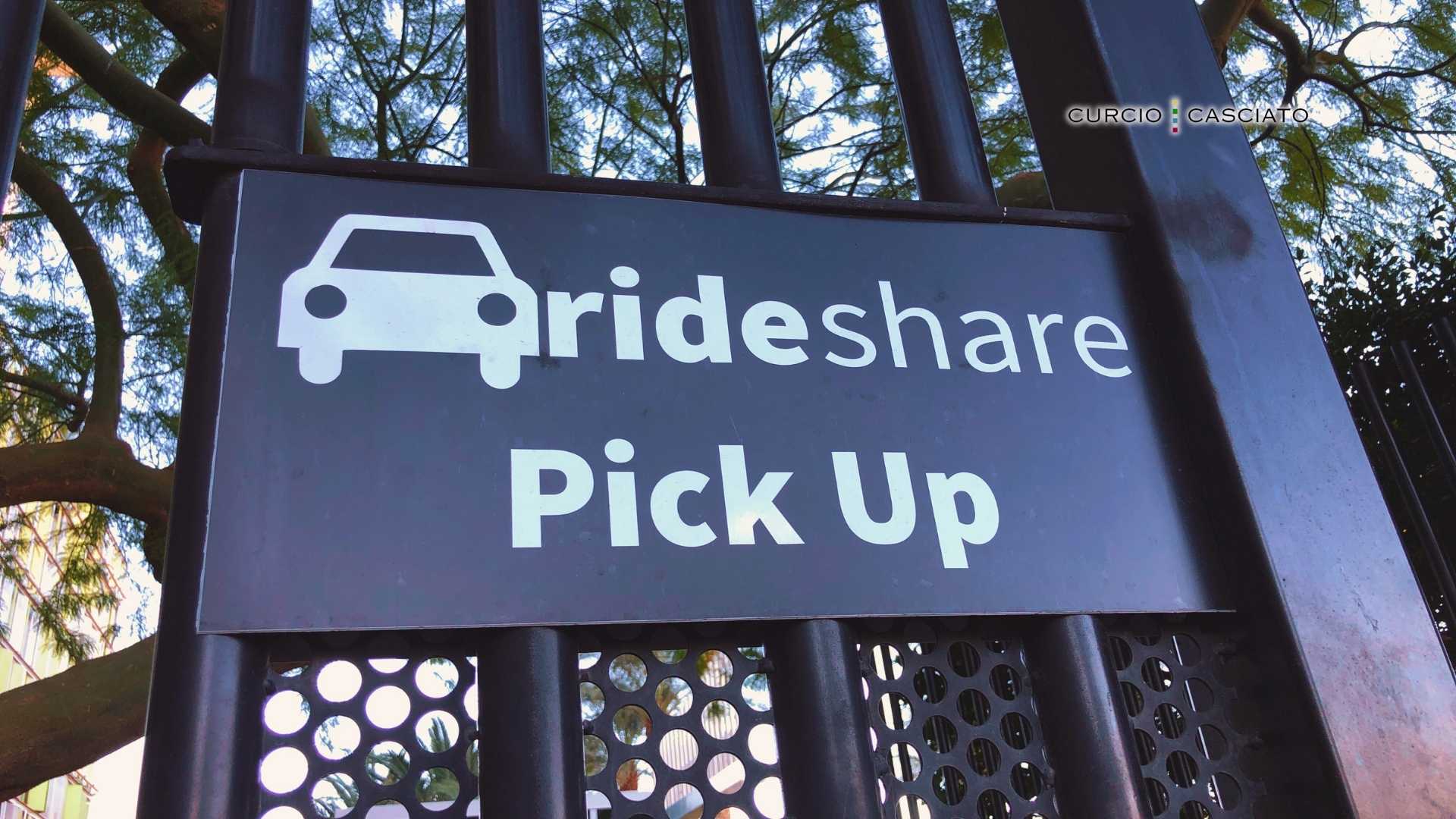
Possible Liable Parties in a Lyft or Uber Accident in Chicago
Determining who is liable in an Uber or Lyft accident in Chicago can be complicated. Potentially responsible parties include:
- Rideshare Driver: If the Uber or Lyft driver was negligent.
- Rideshare Company: Uber and Lyft may share liability for the car accident under certain circumstances.
- Other Driver: If another vehicle caused the car accident.
- Vehicle Manufacturer: For a personal injury case involving defective parts.
- Municipal Entities: If poor road conditions contributed to the car accident.
A Chicago rideshare accident attorney from Curcio & Casciato will conduct a thorough investigation to identify all liable parties and pursue claims against them.
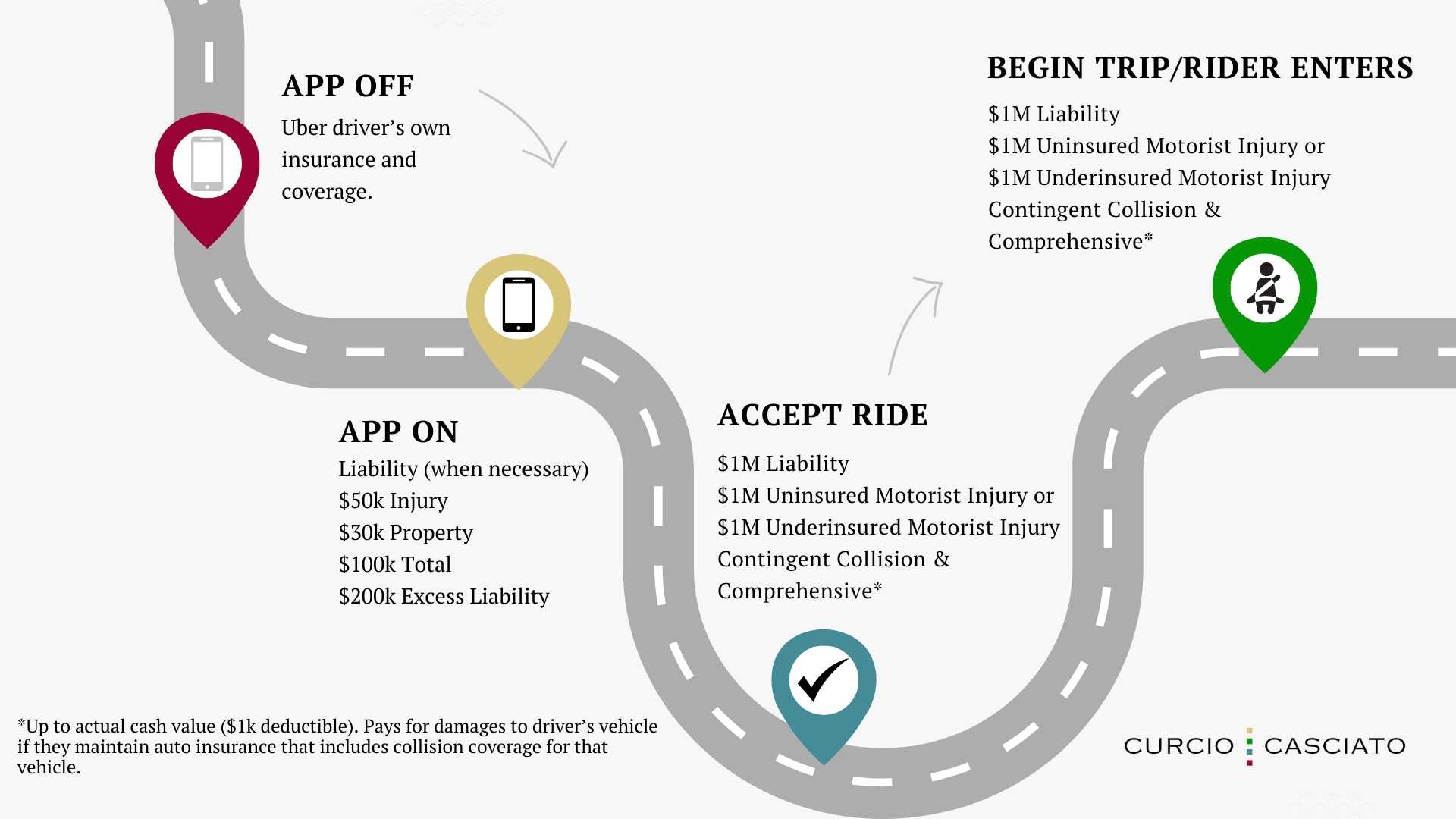
Rideshare Insurance in Illinois
In Illinois, rideshare companies like Uber or Lyft have specific insurance coverage requirements to protect passengers and others involved in a rideshare accident. Each policy varies based on the driver’s status at the time of the car accident, creating different levels of coverage for each situation. A Chicago rideshare accident lawyer from Curcio & Casciato can help if you’ve been injured in a car accident with a rideshare driver.
Uber Insurance Company Policy
In Illinois, rideshare companies like Uber or Lyft have specific insurance coverage requirements to protect passengers and others involved in a rideshare accident. Each policy varies based on the driver’s status at the time of the car accident, creating different levels of coverage for each situation. A Chicago rideshare accident lawyer from Curcio & Casciato can help if you’ve been injured in a car accident with a rideshare driver.
Uber Insurance Company Policy
Uber’s insurance coverage requirements vary depending on the status of their rideshare drivers:
- Offline or Uber App Off: The driver’s personal auto insurance policy applies.
- Uber App is On and Uber Driver is Waiting for Ride Request: Uber’s third-party limited liability coverage applies. Uber insurance policies cover up to $50,000 per person for bodily injury, $100,000 per Uber accident, and $25,000 for property damage.
- En Route to Pick Up or During Trip: Uber’s insurance covers up to $1,000,000 for third-party and passenger injuries and repairing the other vehicle when their rideshare drivers are at fault. Uber also covers the cost of repairing the rideshare vehicle, up to its cash value, with a $2,500 deductible, provided personal insurance policies include comprehensive and collision coverage.
Our Chicago Uber accident attorney group can help clarify Uber’s insurance coverage and determine how it applies to your Uber accident claim.
Lyft Insurance Company Policy
- Lyft App Off: The driver’s personal auto insurance policy applies.
- Lyft App is On and the Lyft Driver is Waiting for Ride Request: Lyft maintains third-party liability coverage, providing at least $50,000 per person for bodily injury, $100,000 per Lyft accident for bodily injury, and $25,000 per Lyft accident for property damage if personal insurance does not apply.
- Lyft App On and the Rideshare Driver is En Route to Pick Up, or During Rides: Lyft provides insurance for a covered Lyft accident, including at least $1,000,000 in third-party auto liability coverage in most markets, as well as first-party coverages like uninsured and underinsured motorist, PIP, MedPay, and occupational accident coverage. If a driver has comprehensive and collision coverage on their personal policy, Lyft offers contingent comprehensive coverage up to the car’s actual cash value with a $2,500 deductible.
Understanding these policies can be challenging, especially when dealing with multiple insurance companies. Our experienced Lyft accident lawyer team can help clarify which insurance coverage applies to your personal injury case.
Who is Liable in Rideshare Accidents in Illinois?
Determining liability in a motor vehicle accident involving a rideshare company can be challenging. Personal injury lawyers experienced in rideshare accidents work to assess the role of the rideshare driver and any other driver who may be at fault and deal with the insurance adjuster on your behalf.
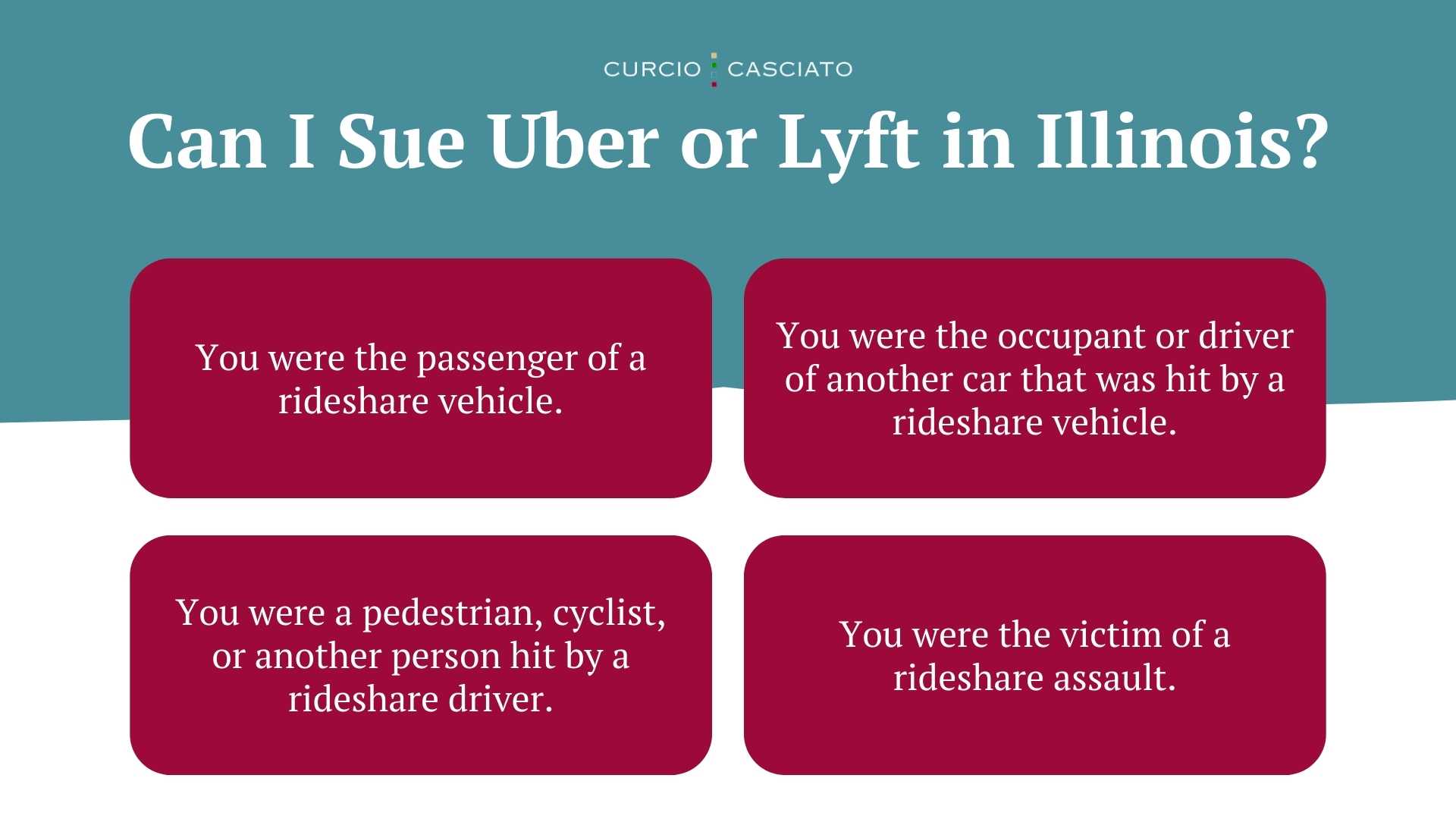
Uber Driver or Lyft Driver At Fault for Car Accidents in Chicago
When an Uber or Lyft driver is at fault in a car accident, their personal auto insurance and the rideshare company’s insurance policy may both apply. A rideshare accident attorney can evaluate these coverage options to determine the best approach to seek compensation for your injuries. Uber or Lyft’s insurance policy typically provides liability coverage for medical costs, lost pay, and other damages if the rideshare driver is logged into the app and actively working.
Handling these claims can be difficult; an experienced Chicago rideshare accident lawyer will work to secure fair financial compensation for your losses.
Uber Driver or Lyft Driver Not At Fault for Car Accidents in Chicago
When an Uber or Lyft driver is not at fault in a car accident, liability may shift to the other driver involved. In such cases, Lyft and Uber insurance policies still provide protection for accident victims, including coverage through uninsured and underinsured motorist policies. A police report can be important in determining fault, as it documents the details of the car accident.
Working with a Lyft and Uber accident lawyer in Chicago can help make sure insurance company claims are processed effectively. Accident victims can seek compensation for medical bills, lost earnings, and other damages with the right legal support.
Modified Comparative Negligence in Illinois
In Illinois, where PIP coverage is not available, individuals who are injured in an accident must rely on their own insurance or file claims against the personal insurance policies of the other driver involved. Since Illinois is an at-fault state, if the other driver is at fault, they’re responsible for damages, and the state’s modified comparative negligence rule applies. Under this rule, you can recover compensation only if you are 50% or less at fault, with your recovery reduced by your percentage of fault. Determining liability for rideshare drivers or taxi drivers can be complex, requiring careful evaluation of evidence and applicable insurance policies. A Chicago rideshare accident lawyer can help ensure accountability and pursue appropriate compensation for your injuries.
Common Rideshare Accident Injuries in Chicago, IL
Rideshare accidents can result in a range of injuries, from minor to severe. After any car accident, it’s important to seek medical treatment promptly, even if there aren’t visible injuries. Internal injuries from car accidents in Chicago can cause major damage if they’re not treated quickly.
Our Chicago rideshare accident attorney team sees the following common injuries in car accidents involving rideshare vehicles:
- Whiplash and Soft Tissue Injuries: Damage to muscles, ligaments, or tendons.
- Broken Bones and Fractures: These often require significant medical attention and recovery time.
- Spinal Cord Injuries: Potentially leading to paralysis or long-term disability.
- Traumatic Brain Injuries: Including concussions and other brain trauma.
- Internal Injuries: Such as organ damage or internal bleeding.
- Eye Problems: Eye problems after a car accident may occur due to head trauma.
- Psychological Trauma: Anxiety, PTSD, or emotional distress following an accident.
These injuries can significantly impact your life and may be grounds for a personal injury claim. Immediate medical attention is key to a full recovery and establishing your claim. Contact a Lyft or Uber accident lawyer in Chicago to learn more.
Compensation for Rideshare Accident Victims
Victims of rideshare accidents may be eligible for a range of compensation depending on the extent of their injuries, medical expenses, and other related losses. Our Chicago rideshare accident lawyer group fights for the following for our clients:
- Medical Bills: Past and future medical expenses.
- Lost Wages: Compensation for income lost due to the inability to work.
- Lost Income: Future earnings lost if you’re unable to return to your previous employment.
- Property Damage: Costs to repair or replace your vehicle or other damaged property.
- Pain and Suffering: Compensation for physical pain and emotional distress.
- Loss of Enjoyment of Life: If injuries prevent you from participating in activities you once enjoyed.
- Punitive Damages: In cases of gross negligence or intentional harm.
The timeline for settling a car accident claim in Illinois can vary and depends on several factors. How long does it take to get a car accident settlement in Illinois? This often depends on the severity of injuries, the willingness of the insurance company to negotiate, and whether the case goes to trial. A Chicago rideshare accident attorney from Curcio & Casciato can help you through this process and work toward a favorable resolution.
Uber Passenger Settlement Amounts Illinois
Uber passenger settlement amount in Illinois depend on several factors. If you’re injured in an Uber accident in Chicago, the severity of injuries plays a significant role, with more serious injuries typically leading to higher Uber passenger settlements. Medical bills, including future care, also influence the compensation amount. Another important consideration is the impact on employment, such as lost wages and reduced future earning capacity.
In recent Illinois cases, Uber accident settlements have ranged from around $50,000 for minor injuries with limited medical attention to over $500,000 for serious Uber accidents requiring extensive medical attention and long-term recovery.
The degree of fault assigned to each party can also affect Uber accident settlement amounts, as can the insurance policy limits of the involved parties. An experienced Uber accident lawyer in Chicago will assess your case to determine a fair settlement amount and advocate on your behalf.
Lyft Accident Settlement Amounts Illinois
In Illinois, Lyft accident settlements have varied based on case specifics. Settlements have ranged from approximately $15,000 for cases involving minor injuries to over $350,000 for more severe incidents requiring substantial medical treatment and rehabilitation.
Negotiating with Lyft’s insurance company requires a thorough understanding of their policies and procedures. Having an experienced Chicago Lyft rideshare accident lawyer can significantly impact the outcome of your case, ensuring that all aspects are meticulously addressed.
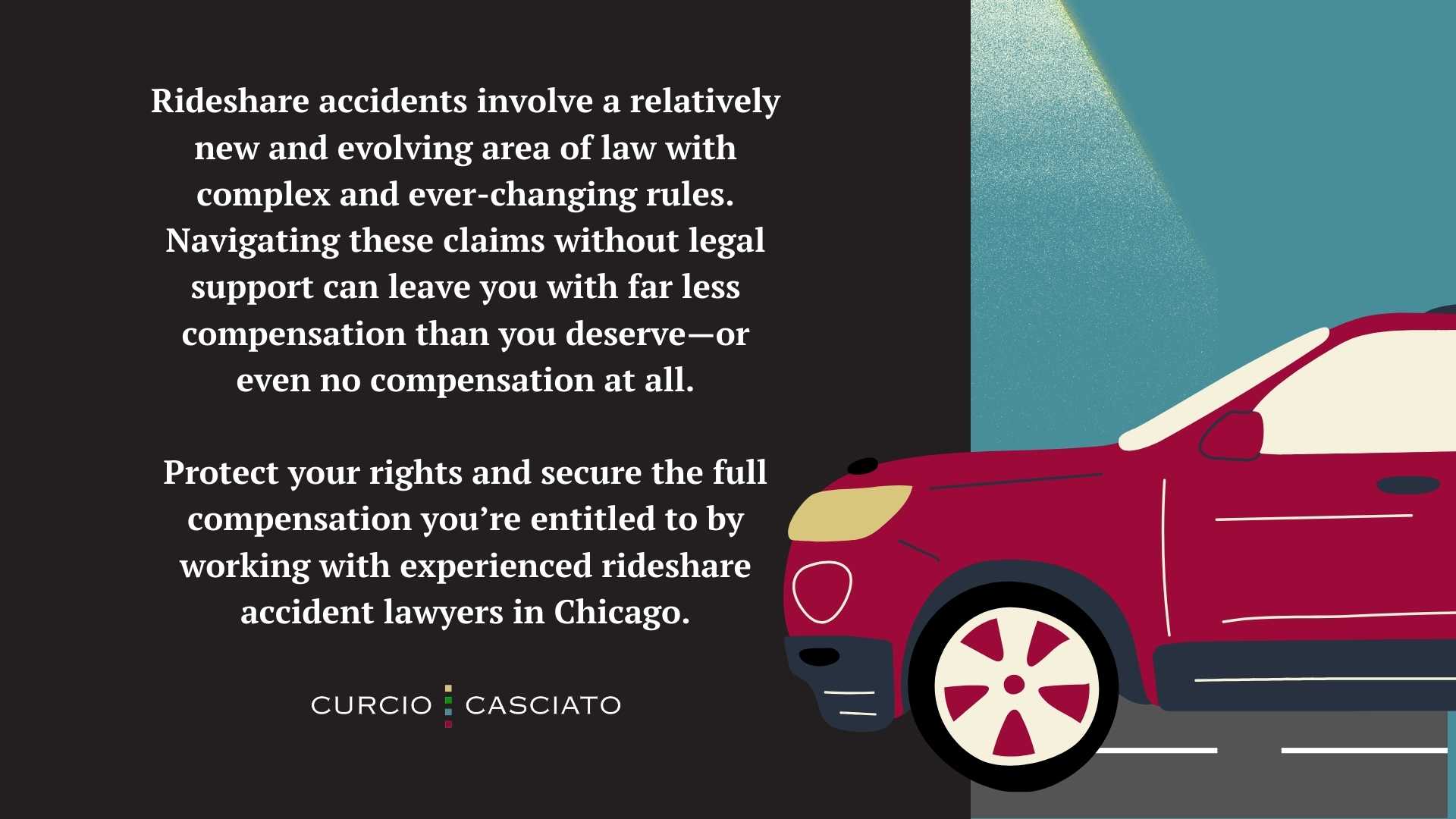
How an Experienced Rideshare Accident Lawyer in Chicago Can Help
Our Chicago auto accident attorney team provides thorough legal support to guide you through this challenging time.
- Free Consultation: We offer a free case evaluation to discuss your situation and potential legal options.
- Investigation: Gathering evidence from the accident scene, securing the police report, and interviewing witnesses to build a strong case.
- Dealing with Insurance Adjusters: Managing communications with insurance companies to protect your rights and pursue fair compensation.
- Filing a Personal Injury Claim: Preparing and submitting all necessary legal documents for your claim.
- Negotiation: Working toward a fair settlement with the insurance company.
- Litigation: Representing you in court if a satisfactory settlement cannot be reached.
- Medical Treatment Coordination: Helping you find medical professionals to address ongoing care needs.
When you work with an experienced rideshare accident attorney in Chicago, we’ll handle the legal process, allowing you to focus on your recovery.
Chicago Rideshare Accident Attorney
Our dedicated Chicago rideshare accident attorney team is here to provide the legal representation you need to seek fair compensation for your injuries and losses. We have the knowledge and experience necessary to handle every aspect of your personal injury claim.
Working through insurance policies can be challenging, as rideshare accidents often involve complex layers of coverage, from auto insurance to rideshare company policies. Our rideshare accident lawyers in Chicago handle all aspects of your case, from investigating the accident scene to gathering evidence, such as the police report, and managing communications with the insurance company.
With an experienced Chicago Uber and Lyft accident attorney, you’ll have a legal team dedicated to fighting for your rights and pursuing maximum compensation to cover medical expenses, lost wages, and more.
With our guidance, you’ll have help in understanding the legal steps, managing insurance claims, and negotiating for the compensation you deserve. Call us today at (312) 321-1111 to get started so you can focus on your recovery while we handle the legal work.
Remember, time is limited for pursuing a claim. Illinois has a statute of limitations for filing personal injury cases, so it’s important to act quickly to protect your rights. Contact a rideshare accident attorney as soon as possible to secure legal representation and take the first step toward obtaining the compensation you need.


